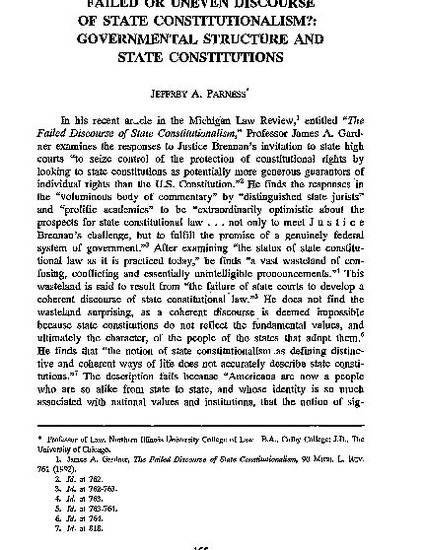
ln his Michigan Law Review article, "The Failed Discourse of State Constitutionalism," Professor James A. Gardner examines the responses to Justice Brennan's invitation to state high courts "to seize control of the protection of constitutional rights by looking to state constitutions as potentially more generous guarantors of individual rights than the U.S. Constitution." He finds the responses in the "voluminous body of commentary" by "distinguished state jurists" and "prolific academics" to be "extraordinarily optimistic about the prospects for state constitutional law . . . not only to meet Justice Brennan's challenge, but to fulfill the promise of a genuinely federal system of government." But after examining "the status of state constitutional law as it is practiced today," he finds "a vast wasteland of confusing, conflicting and essentially unintelligible pronouncements." This wasteland is said to result from "the failure of state courts to develop a coherent discourse of state constitutional law." He does not find the wasteland surprising, as a coherent discourse is deemed impossible because state constitutíons do not reflect the fundamental values, and ultimately the character, of the people of the states that adopt them. He finds that "the notion of state constitutionalism as defining distinctive and coherent ways of life does not accurately describe state constitutions." The description fails because "Americans are now a people who are so alike from state to state, and whose identity is so much associated with national values and institutions, that the notion of significant local variations in character and identity is just too implausible to take seriously as the basis for a distinct constitutional discourse." The failure of a state's constitution and its interpretation to reflect its people's values and character, and the present actual lack of local values and character, do not trouble Professor Gardner. Such a reflection or local identity "could pose a serious threat to the nationwide stability and sense of community that national constitutionalism provides." ln many ways, Professor Gardner is happy to observe that Justice Brennan's invited discourse on state constitutionalism has failed. I leave to others, presumably excessively optimistic jurists and academics, the task of responding to Professor Gardner's vision of the real and ideal role of state constitutions and state high courts in guaranteeing individual rights. Herein, l will briefly explore the real and ideal role of state constitutions and state high courts in defining state governments. There, in my víew, state constitutionalism does more to fulfill signifícantly the promise of a genuinely federal system of government. There, states do, and should, acknowledge very different common identities. Such differences do not endanger nationhood. By focusing almost exclusively on individual rights, Professor Gardner has not seriously considered the discourse of state constitutionalism on the powers of government, on what factors explain any inadequate discourse in this area, and on what can be done to correct any troubling discourse. My observations on governmental structure in state constitutions are intended to broaden the discussion of state constitutionalism spurred by Professor Gardner's article.